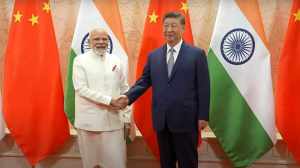No free entry to MNCs, please
Ever since we started liberalising the common refrain of all political parties has been that we need MNCs to build our infrastructure. Tha...

Ever since we started liberalising the common refrain of all political parties has been that we need MNCs to build our infrastructure. That policy had some merit. Unlike foreign trade, foreign investment is basically har-mful because it sucks out the national we-alth in the long run. But the negative impact was partly offset by the benefits from the development of infrastructure. The efforts to attract MNCs in this sector, th-erefore, had some justification. Now the BJP has announced its intention to allow free entry to MNCs in all sectors except for a small negative list relating to SSIs and defence. This is a disastrous policy because the hitherto half-negative impact of foreign investment will now become fully-negative.
The dominant thinking so far had been that the MNCs would build the nation8217;s infrastructure. The FI inflows would increase the liquidity in the money market, enable the government to borrow at low rates of interest and help it increase its expenditures in other sectors. In reality thisincreased borrowing has been used to feed the government8217;s massive bureaucracy. The government8217;s need to borrow was a compulsion for it to reform the infrastructure sectors.
Our infrastructure has so far been the preserve of the public sector. It is inefficient and corrupt. It has consistently opposed competition from the private sector. But the government needed the dollars to enable it to borrow cheap, therefore, it had been pushing these reforms despite such opposition. And once the government pr-ied them open to attract MNCs, Indian businessmen could follow suit. In the early Nineties, a businessman confided that the reason he was not opposing Enron was that the government would remove the red tape under its pressure. Once that was done, he could follow, which he indeed did.
This policy had some benefit. Even though the MNCs would have siphoned off the nation8217;s wealth and government bureaucracy would have continued to bloat, at least the country would have got its much needed infrastructure.No longer.The BJP8217;s resolve to allow MNCs free entry implies that MNCs could henceforth come largely in the consumer goods sectors. The objective of the government to borrow cheap would now be possible without the reform of infrastructure sectors.
There is plenty of indication that this is indeed happening. According to UNCT-AD8217;s Trade and Development Report 1999, the increase in FDI inflows to the developing countries in the Nineties has come from mergers and acquisitions of domestic firms which, in the main, are not in infrastructure sectors. FDI inflows in greenfield investments have, in fact, shown a declining trend.
Free entry to MNCs therefore will hit infrastructure twice: 1 The expected MNC investment in infrastructure may not materialise. The investing governments and multilateral agencies will be more satisfied with MNC entry in consumer goods sectors; and 2 the diversion of MNCs will take the heat away from opening the road block for domestic private investors.
None of the opposition parties hasever sought free MNC entry. The Congress manifesto for the last election, for example, co-mmits itself to attracting 8-10 billion dollars of FDI every year. But it speaks of encouraging Indian and foreign companies to add 8000 MW power generating capacity every year. It speaks of reviewing limits of existing FDI ceilings in telecom sector. It talks of op-ening insurance to minority investment by MNCs and attracting foreign Venture Cap-ital Funds and Private Equity Funds. But nowhere does it seek free entry of MNCs in consumer goods. The Congress ally Laloo Prasad Yadav too has been vociferous ag-ainst opening the economy to MNCs.
The Left parties too appear to be more nationalistic in this matter. The CPM has rightly attacked the BJP for outstripping the Congress in opening swadeshi economy to videshis. The CPI manifesto likewise attacked the BJP for allowing 8220;indiscriminate entry of MNCs8221; and calls for resisting opening of the financial sector to international finance. All these parties must cometogether and oppose the policy of allowing free entry to the MNCs so that the pressure on the government to increase investment in infrastructure is not reduced.
Jhunjhunwala is a freelance writer based in Delhi
- 01
- 02
- 03
- 04
- 05































